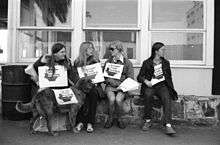USS Kitty Hawk riot
 USS Kitty Hawk c. 1975 | |
| Date | 12/13 October 1972 |
|---|---|
| Location | off Vietnam |
| Participants | Kitty Hawk crew |
| Outcome | 45–60 crewmembers injured (3 seriously) |

The USS Kitty Hawk riot, sometimes called the Kitty Hawk mutiny, was part of widespread antiwar protests within the US armed forces which took place as part of a movement called SOS (Stop Our Ships/Support Our Sailors) on the United States Navy aircraft carrier Kitty Hawk on the night of 12/13 October 1972, off the coast of Vietnam while participating in Operation Linebacker of the Vietnam War. A report by the House Armed Services Committee concluded that the rebellion had been precipitated by orders received to return to Vietnam from Subic Bay. These orders were given after incidents of sabotage by American sailors had disabled USS Ranger and USS Forrestal. Kitty Hawk was eventually forced to retire to San Diego and was removed from the war.[1]
The riot was led by African-American crew members who responded violently when Marines attempted to disrupt their protest meetings. Three had to be evacuated to shore hospitals for further treatment. Forty-five to sixty Kitty Hawk crewmen were injured in total. The ship's captain, Marland Townsend, and executive officer, Commander Benjamin Cloud (who was African-American), dissuaded the rioters from further violence. This allowed the carrier to launch her Linebacker air missions as scheduled on the morning of 12 October. Nineteen of the rioters were later found guilty by the Navy of at least one charge connected to the riot.
The incident was publicized in The New York Times. Subsequent unrest on Kitty Hawk′s sister ship Constellation was, in a similar fashion, described by the media as a "racial outbreak" in an effort to downplay the antiwar movement within the armed forces. However, many of its crew were active participants in the SOS movement, having earlier produced a petition with 1,500 signatures to allow Jane Fonda's antiwar show to perform on board, produced their own antiwar newsletter (as did Kitty Hawk, entitled Kitty Litter), and supported dozens of servicemen who refused to board for Vietnam duty.
See also
References
- ↑ Franklin, 'Vietnam and Other American Fantasies', University of Massachusetts Press, 2000
- Franklin, H.Bruce (2000). Vietnam & Other American Fantasies. Amherst: University of Massachusetts Press. ISBN 978-1-558-4927-90.
- Almond, David B. (2013). A Sailor's Story in Black & White: Battle For the Hawk. Florida: Xulon Press. ISBN 978-1-625-09390-5.
- Freeman, Gregory A. (2009). Troubled Water: Race, Mutiny, and Bravery on the USS Kitty Hawk. New York: Palgrave Macmillan. ISBN 978-0-230-61361-4.
- Sherwood, John Darrell (2007). Black Sailor, White Navy: Racial Unrest in the Fleet During the Vietnam Era. New York: New York University Press. ISBN 978-0-8147-4036-1.
- United States Congress, Committee on Armed Services House of Representatives (2 January 1973). "Report by the Special Subcommittee on Disciplinary Problems in the U.S. Navy. 92nd Cong., 2d sess., 1973, H.A.S.C. 92-81" (Congressional committee investigation report). United States Naval Historical Center. Retrieved 9 November 2009.